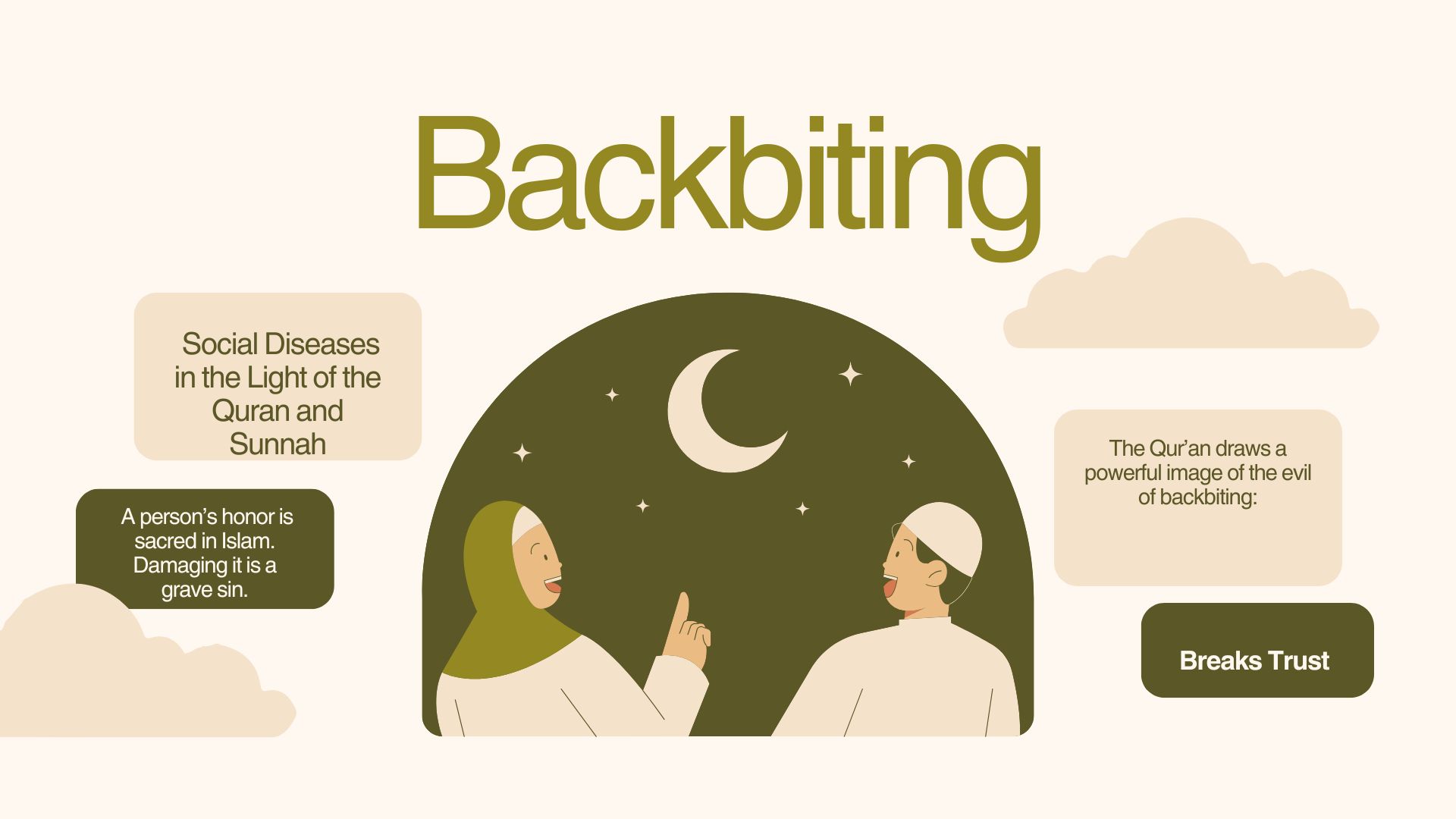Social Diseases in the Light of the Quran and Sunnah
Backbiting and slander are two of the most destructive social diseases that tear apart relationships, destroy communities, and weaken the moral fabric of society. In Islam, both acts are strictly forbidden and condemned in the strongest terms. The Qur’an and Sunnah provide clear guidance about the severity of these sins and offer solutions for eradicating them from our lives.
What is Backbiting (Gheebah)?
The Prophet Muhammad (peace be upon him) defined it explicitly:
“Do you know what backbiting is?”
The companions said: “Allah and His Messenger know best.”
He said: “To say something about your brother that he dislikes.”
Someone asked: “What if what I say is true?”
The Prophet replied: “If what you say about him is true, then you have backbitten him; but if it is not true, then you have slandered him.”
(Sahih Muslim)
This hadith clearly distinguishes between backbiting (truthful defamation) and slander (false accusations), both of which are prohibited.
What is Slander (Buhtaan)?
Slander goes a step further than backbiting. It involves fabricating lies or spreading false information to damage someone’s reputation. It is considered even more severe than backbiting because it combines both falsehood and harm.
Allah warns in the Qur’an:
“And those who harm believing men and believing women without them having done anything wrong, they bear the guilt of slander and clear sin.”
(Surah Al-Ahzab, 33:58)
Condemnation in the Qur’an
The Qur’an draws a powerful image of the evil of backbiting:
“O you who have believed, avoid much suspicion. Indeed, some suspicion is sin. And do not spy or backbite one another. Would one of you like to eat the flesh of his brother when dead? You would detest it!”
(Surah Al-Hujurat, 49:12)
This verse shows the disgusting nature of backbiting, comparing it to cannibalism. The imagery is so powerful that it aims to instill a deep emotional and moral aversion toward such behavior.
Why Are These Sins So Harmful?
Breaks Trust – Backbiting and slander erode trust among individuals and communities.
Spreads Hatred – They lead to grudges, fights, and long-lasting resentment.
Destroys Reputation – A person’s honor is sacred in Islam. Damaging it is a grave sin.
Leads to Hypocrisy – Engaging in such actions behind people’s backs shows a double-faced character.
Teachings from the Sunnah
The Prophet Muhammad (peace be upon him) lived by the highest moral standards and strictly warned against gossip and slander.
“A backbiter will not enter Paradise.”
(Sahih Bukhari and Muslim)
This hadith underscores how severely backbiting is viewed in Islam—it may become a barrier to entering Paradise.
How to Avoid Backbiting and Slander
Guard Your Tongue – Speak only when necessary and beneficial.
Change the Topic – If someone starts backbiting, change the subject or walk away.
Defend Others – Speak in defense of the absent person.
Reflect Before Speaking – Ask yourself: Would I say this in front of them?
Repent and Seek Forgiveness – If you’ve backbitten someone, repent and ask for their forgiveness if possible.
Conclusion
Backbiting and slander are not just minor faults—they are major sins that harm individuals and the community at large. As Muslims, we are urged to create a society based on honor, trust, and respect. The Qur’an and Sunnah offer clear guidance to help us stay on the straight path. Let us purify our hearts and tongues, and strive to build a more honest and compassionate society.


Leave A Comment